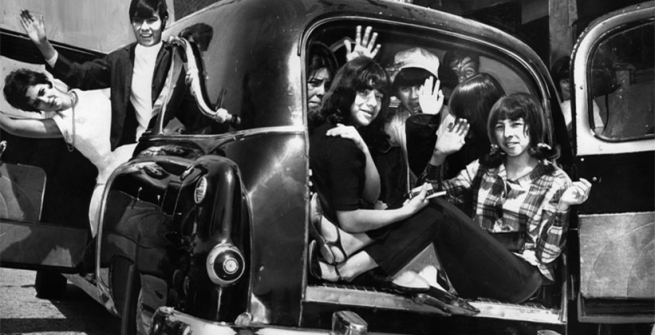I am a refugee, an immigrant, an American. I came to the United States as a young girl and grew up in Los Angeles. My maternal grandparents were born in Cuba and were descendants of immigrants from Spain, who moved to Cuba to make a better life for themselves.
The current fear and blaming of immigrants and refugees isn’t something new to the United States. Although this country was founded by immigrants escaping oppression, persecution, and poverty, new Americans have traditionally been seen as job-stealing criminals who are a threat to the American way of life. First it was the Germans, then the Irish, then Asians, Arabs, Catholics, Jews, and now Hispanics and Muslims. But the reality is that most Americans are pro-immigrant and know that immigrants contribute to the community as well as the economy. In fact, a 2016 Pew Research poll showed 59% of Americans believe that immigrants "strengthen our country because of their hard work and talents."
My grandparents lived under a dictator, who was later replaced by another dictator. When everything they worked so hard for was taken away and became property of the government, and citizens were no longer allowed to speak their mind, they left Cuba.
My family was fortunate because we were allowed to leave Cuba (many were not able to leave, including my father), and we were refugees from a Communist country, so we became legal residents upon entering the United States. Not everyone is as fortunate.

Author Teresa Mons holds her mother Aida Victorero's hand, with siblings Aida and Alfredo Mons.
A few months after arriving in the United States, and with the help of my grandparents who immigrated before us, my mother managed to find a one bedroom apartment. The furniture we had was acquired behind houses in alleys, where wealthier people disposed of their belongings when they no longer had use for them. The clothing we had was donated by our local church. My mother, who had a husband, my father, and had previously lived a somewhat privileged life in her native country, was now on her own with three young children in a country with different customs whose people spoke a language she did not understand. She now spent her day cleaning other people’s homes while we were in school in order to pay the rent and put food on the table.
While mom worked, my siblings and I went to school, which was terrifying because we didn’t speak a word of English. I had trouble pronouncing certain words, such as "chair," which, when I said it, sounded more like "share." My classmates would laugh at my pronunciation, but eventually the school got me a speech therapist, who helped immensely. My mother could not help with homework, so I struggled at times, but eventually things got easier.
It didn’t take long for me to assimilate. I spoke perfect English, hand-clapped with friends to "down down baby," played basketball, had a Barbie, and watched all the popular TV shows. I ate pizza, hot dogs, burgers, and fries.
But at home, my mother was still very Cuban. We spoke Spanish, ate Cuban food, watched telenovelas, and played Cuban dominoes. My friends were mostly Caucasian or Mexican, so my culture was foreign to them, and I was often embarrassed because we were so different. To my Caucasian friends, I was different, but they couldn’t tell the difference between Spanish speakers, so to them I was "Mexican." To my Mexican friends, I was different too: my Spanish was different, and the food I ate was different.
I felt I lived in different worlds: one at home, and one outside of home, and didn’t feel I belonged in either one. So my early teenage years were spent at the local library, where I had access to books, which made me feel less alone.

By high school, my grandparents had passed away, so all that remained of my Cuban heritage was my mom. I watched John Hughes movies, listened to new wave, and highlighted my hair so that I would look more like the women in the magazines and on television. I wanted to be "American," and by college had become an American citizen and was completely immersed in American culture. I received a BA in English Literature, and eventually went to library school, since the library was a place that always welcomed me, it was a place where I sought refuge, a place that was home to thousands of stories in which I could escape.
I now feel comfortable in both worlds, and am grateful to have grown up in an immigrant household. As a librarian, I am grateful that I speak Spanish and can help not only Spanish speakers whose families are new to this country, but also immigrants in general. My history gives me an understanding of the struggles immigrants go through. I see shy children who have to overcome their fears in order to translate for their parents, parents overwhelmed by language barriers and their circumstances, and teens who are afraid for their parents and trying to figure out where they themselves fit in, and I see MY family.
I visited Cuba a few years ago to meet the family members I never had the opportunity to know. Everyone on the plane cheered when they landed on Cuban soil (the plane full of Cuban Americans who still have family in Cuba) and cheered when they landed on American soil. I realized then that we are all American, whatever our ethnicity; we all have roots elsewhere, some of our roots are just closer to the surface.
